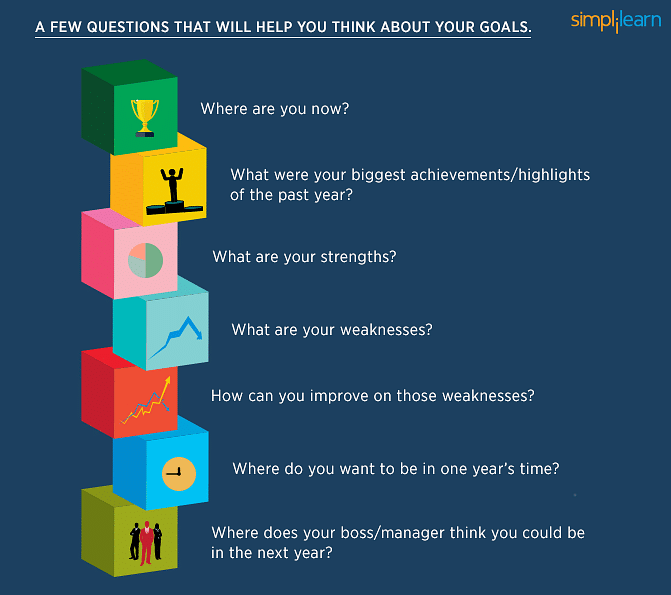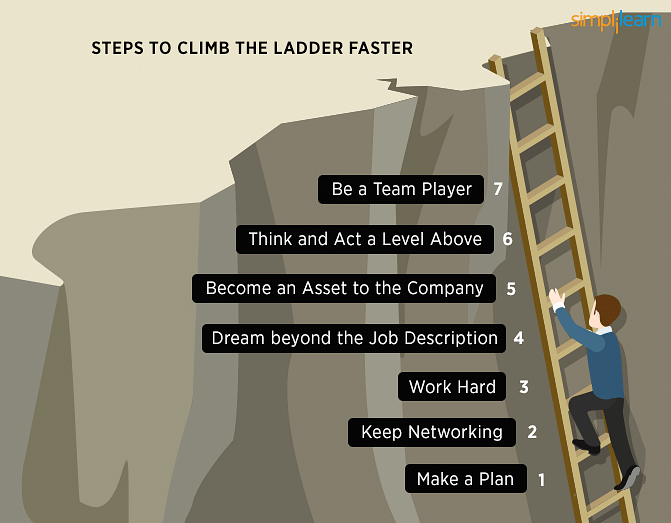Born sometime between 1982 and 2000, Millennials now make up the biggest part of the workforce in the U.S., but the career advice they need differs from that of earlier generations. Millennials, in general, don’t want to work for one company for their entire career. They don’t want to be simply a cog in a wheel, or a body earning a paycheck. Millennials want to work for companies they care about, doing work that makes a difference, and working the hours they set—not the hours dictated by a manager or manual. They want to learn and grow, with mentors to guide them. And they are willing to change jobs frequently to make this happen, with people aged 25 to 34 years old changing jobs about every two and a half years.
So, What Is a Corporate Ladder?
What Is a Corporate Ladder?
The expression "How to Climb the Corporate Ladder" signifies progress inside an organization from the basic level to the top level through promotions. The corporate ladder seems hard to climb because organizations commonly have a more significant part of entry-level positions and fewer positions to enter mid and upper-level management positions.
Now, moving forward, let us focus on the topic i.e., “how to climb the corporate ladder”. So, how do you do it?

All these striking differences mean the career advice that worked for older generations might not apply to Millennials who want to climb the corporate ladder, but on their own terms.
In this article “how to climb the corporate ladder”, we offer career advice specifically for Millennials as we cover:
• The Importance of Setting Career Goals
• Tips for Setting Career Goals
• 7 Tips to Help you Climb the Career Ladder Faster
In order to understand “how to climb the corporate ladder” let us understand The Importance of Setting Career Goals.
How to Climb the Corporate Ladder:
1. The Importance of Setting Career Goals
As the saying goes, if you don’t know where you’re going, how will you know how to get there? This applies to any goals you want to accomplish, from saving money for a down-payment on a house to losing weight to advancing in your career. Goals are important because:
Goals keep you motivated
On those days when you’re questioning why you’re working so hard, your goals remind you of what you’re trying to achieve, to motivate you to keep going.
Goals give your personal life and work-life direction
Your personal life and your work life go together, even though you live them separately. It’s easier to achieve that elusive work/life balance when you have goals that give your life a direction—at home and in the office.
Goals help you measure progress
When you’re working towards goals, it’s easier to recognize the progress you’ve made, and that can motivate you to keep going.
Goals help you celebrate your achievements along the way.
When you’re working towards a goal and measuring your progress, you can celebrate small milestones along the way, which can further motivate you to keep going. It can be a small celebration, such as dinner at a favorite restaurant or a splurge on a new pair of shoes, or even a fancy coffee on your way to work.
Without a goal or a few goals, you’re more likely to be a hamster on a wheel than a young professional moving his or her way up in the world.
Next, we will see the tips for setting career goals in order to know how to climb the corporate ladder.
2. Tips For Setting Career Goals
Setting goals are vital to your career success, but knowing how to set goals is also critically important. It’s one thing to state a goal and another to be able to set a goal that is attainable and realistic.
Before you start goal setting, consider doing a self-assessment to help you determine some parameters for your goal setting. The questions you ask yourself might be:
- Where are you now?
- What were your highlights from the past year?
- What are your strengths? Your weaknesses?
- How can you improve on your weaknesses?
- Where do you want to be a year from now?
- Where does your boss think you could be in a year?

After doing a self-assessment, you should have a clearer vision for setting your career goals. In addition to asking yourself those questions also keep in mind the following:
- Make both short-term and long-term goals. You need both. Short-term goals can be easier to set and achieve. Long-term goals give you a big picture view of your ultimate goals. Setting short-term goals can keep you motivated as you achieve them, and they should help you to eventually accomplish your long-term goal.
- Talk to someone about your goals. Get input from a mentor or manager to make sure your goals are reasonable. You also need input to make sure your goals are ambitious enough! In addition, your manager will know after talking to you that you want to move up the career ladder and that you’re proactively working towards that goal.
- Be flexible. Goals should not be set in stone. Do you know the saying “Life is what happens when you’re busy making other plans”? You can’t predict the future, so be flexible about your goals so they can adapt as necessary. Also be sure to review them on occasion to see if they need adjusting to new circumstances.
Moving forward, let us understand the 7 tips for understanding how to climb the corporate ladder faster.
3. Top 7 Tips for Climbing the Career Ladder Faster
After you’ve done your goal setting, your next step is working towards those goals and climbing that career ladder. No matter your goals or career field, you can apply seven tips to help you make your way up that ladder faster.
If you are wondering how to climb the corporate ladder faster check out these tips.

1. Make a Plan
As with goal setting, a plan is necessary as your roadmap to your next career goal. It can be a short-term or long-term plan, but have a plan!
2. Keep Networking
The more people you know, the better for your career. Even when you have a job, you want to keep building your network, both online and in person. That way you’ll have connections to reach out to when you’re ready for a career move or you’re in need of a mentor.
3. Work Hard(er)
Go above and beyond at work, doing more than the minimal requirements. Work harder and longer than the others on your team, but also work smarter. Volunteer for high-visibility projects. Seek to contribute more, and make yourself the go-to person. Get to work early, and leave late.
4. Dream Beyond the Job Description
Your job description might be limited but that doesn’t limit you. Do whatever is assigned to you, then ask what else you can do, even if it's in another department or on another project. Help wherever you can, whenever you can, however you can.
5. Become an Asset to the Company
Be more than the person at that desk. Continuously strive to up-skill yourself and learn new skills. Take certification courses. Study and follow all the industry leaders wherever they are active, and attend conferences. The more you learn and know, the more of an asset you will be to your employer.
6. Think and Act a Level Above
Do you know the advice to act “as if”? If you want to a job farther up the career ladder, act “as if” you already have that job. Think like someone higher up. Pay attention to how those above you act, manage, delegate, mentor and communicate, and emulate their behavior. What skills have they mastered? Learn those skills.
7. Be a Team Player
Lastly, but most importantly, be a team player. Employers are closely looking at the way employees work with the rest of the team, as well as other departments. If you are viewed as a team player, it is a huge advantage to your career.
With that, we have come to the conclusion of the article “ how to climb the corporate ladder“
Conclusion
In this article “how to climb the corporate ladder” we learned that millennials get a lot of bad press in the media as they’re labeled self-centered, entitled, and lazy. Some people view the job-hopping that’s typical of Millennials as proof of these negative labels. In reality, however, many Millennials are simply trying to forge a new kind of career path, one that focuses more on social issues than paychecks and allows for a flexibility that technology today enables through flex-time and remote work. When you as a Millennial are clear in your goal setting and you’re taking definite steps to move up the career ladder, you will dispel the myths of the Millennial and show the world that just because your priorities might differ, your ability to achieve your goals does not.
If you are planning to take up a course, we suggest you take up PMP certification, this will help in your career growth.
